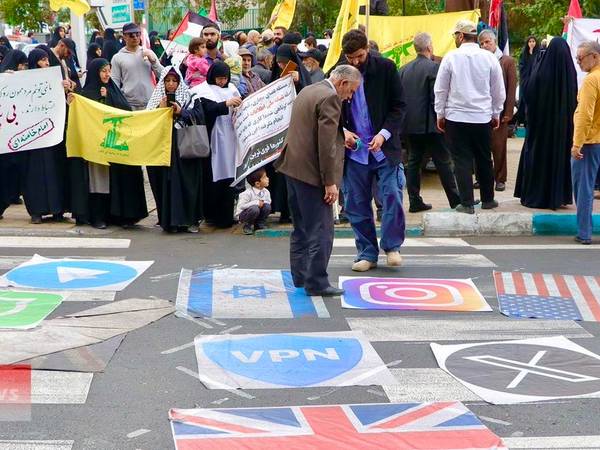Dozens of protesters, organized by a vigilante group, gathered in Tehran on Wednesday, chanting in opposition to President Masoud Pezeshkian's remarks and the growing calls for lifting internet filtering.
Pezeshkian has been under pressure from the public not to break his campaign promise to lift internet filtering.
On Tuesday, he reaffirmed his commitment to his promise, stating that to prevent future complications, his administration is collaborating with other government institutions, including Parliament and the Judiciary, to remove the obstacles to lifting internet restrictions.
The plan to hold the rally was announced on social media platforms Tuesday by the group calling itself the “Hezbollah umma (people)”.
The poster widely shared by the organizers on various social media platforms invited those opposed to free internet access to convene to demonstrate their opposition to the plans that allow “cultural infiltration of the Zionist regime in the country”.
Videos posted on social media show the protesters chanting and waving flags of the Hezbollah outside the building of the National Cyber-Space Center near a major square in northern Tehran.
A notorious vigilante leader, Hossein Allahkaram, used a loudspeaker to address the participants in the rally from the back of a small pick-up truck parked on the road median.
He urged the authorities not only to continue internet filtering but also to block the bandwidth allocated to Instagram, WhatsApp, and Telegram traffic so that even anti-filtering software could not provide access to them. These platforms are already blocked and people use VPNs to secure access.
“Israeli Instagram, Telegram, and WhatsApp must be shut down” and “No country allows so much freedom to enemy [social media] platforms like Iran”, some of the protesters’ banners read.
These platforms “help Zionists, are Zionists, or have branches in the Zionist regime”, one of the participants in the rally said in a video posted by the reformist Shargh Daily on X.
Tens of millions of Iranians must use anti-filtering software to access major international social networks, including Google Play, and tens of thousands of websites.
Moreover, millions of Iranians use social media platforms, particularly Instagram, Telegram, and WhatsApp to promote small and medium-sized businesses, particularly those run from home by women or small farms in rural areas.
A report published by the Tehran E-Commerce Association in January contended that the use of anti-filtering software makes users’ equipment more vulnerable to cyber threats and exposes online businesses to greater risks of user data leaks.
Iranian security forces will normally interfere without hesitation and suppress any “unauthorized” protest rallies, even very small, for ‘violating public peace’ but Iranian media say security forces did not interfere with ultra-hardliners’ rally on Wednesday.
Pointing out that the indifference of the security forces, the head of the Reformist Front, Azar Mansouri, asked the authorities in a tweet whether those who oppose filtering can also enjoy such freedom in holding protests.
Pro-establishment hardliners have on many occasions held similar rallies without any trouble but an article Tuesday in Mashregh newspaper seemed to suggest that authorities are concerned that the vigilante group’s insistence on keeping internet censorship may spark a new wave of anti-government protests and unrest in the country.
Mashregh is a news website with alleged links to the Revolutionary Guard Intelligence Organization (SAS).
The article entitled “Behind the Scenes of Anti-Security Calls to Protest in Iran/ The US Plot for Simultaneous Unrest in Iran and Lebanon” alleged that those who called to protest were “groups feigning to be revolutionary” that sought to “polarize” the society in line with such supposed US plans instead of fostering unity in the face of “current threats”.
The Revolutionary Guard-linked Fars News Agency, along with other conservative outlets, published the Mashregh article in full.
Mashregh News cited the hardliners' protests against former President Hassan Rouhani's economic policies in Mashhad in December 2017 as a historical parallel.
What began as a hardliner-organized demonstration quickly spiraled out of control when disillusioned citizens joined in. This sparked spontaneous, leaderless protests across the country, targeting not just the government’s economic policies but the entire Islamic Republic and its religious authoritarianism, prompting a heavy crackdown.
